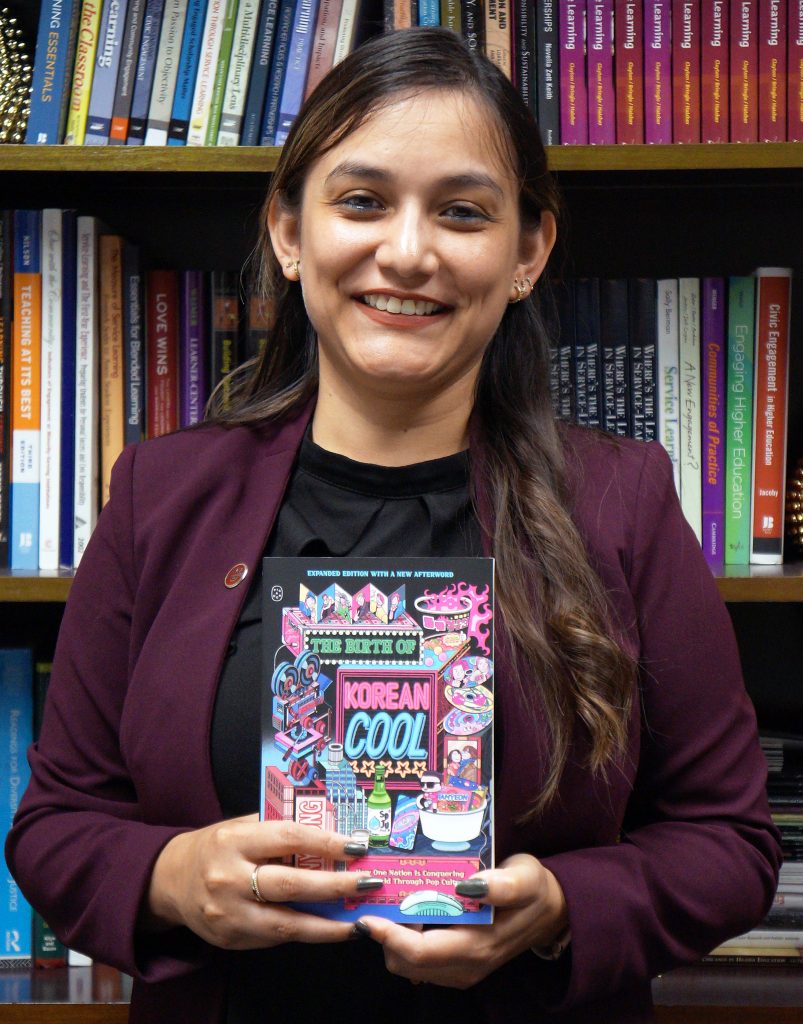INTERNATIONAL: Reading the Globe opens up for any TAMIU student
By Jack Reyes
Bridge contributing writer
Published Thursday, Oct. 23, 2025
The University’s Reading the Globe program underwent some changes this semester. Once part of University Seminar, UNIV 1201, the program is now managed under the Office of the Provost to allow more students to join, while maintaining its focus on global learning.
Texas A&M International University Director of the Quality Enhancement Plan Cihtlalli Perez said the change will be used to open doors to more students than before.
“Reading the Globe is a type of experiential learning experience,” Perez said. “Even if they are not interested in traveling abroad, they can still participate in any of the activities we’ll have for Reading the Globe, so they can see and learn about other cultures.”

Reading the Globe Adviser and QEP Director Cihtlalli Perez poses with the book The Birth of Korean Cool, which is being read by this year’s Reading the Globe students.
A change in structure
The program officially moved to the provost’s office between the spring and summer semesters. Perez said this means students who enter TAMIU with credits are able to participate, even without being enrolled in a UNIV course, which is enforced for incoming freshmen without any credits. At this same time, the now defunct University College was transformed into the School of First-Year Experiences and its faculty absorbed into the College of Arts and Sciences, with the new school directed by Instructional Assistant Professor Daniel De la Miyar.
“Before, you had to be enrolled in 1201,” Perez said. “This opens up to more students, because we wanted to ensure that even if they came with college credits, they’re still able to participate.”
Junior accounting major Paulina Salazar said the new structure provides an alternative kind of preparation to the students.
“RTG had been part of the UNIV 1201 class for years,” Salazar said. “So, of course, this is a big change. I consider this change was made with the future student ambassadors in mind, and I think it’s great if this means they will get a better and improved preparation before going on the trip. Adding the course also adds an extra layer for students to bond and get to know each other before the trip.”
Reading the Globe began at TAMIU in 2008 and has helped students travel to many countries through a common book read and trip experience. This year’s program centers around South Korea. According to the RTG site, the aim of the program is to create cultural awareness and interaction among the students getting acquainted with the First-Year Experiences and thereafter.
Student perspective
For some students, RTG is a big motivator to try something new. Sophomore communication major and studio arts minor Alisa Mendoza wondered if she would get an opportunity to take part in the program at all.
“I had always wanted to travel in general,” Mendoza said. “To know that this opportunity was free was a huge motivation, so it got me interested.”
Mendoza went to Chile through RTG and said it completely changed how she viewed education.
“The thing that I love about the RTG program is the service-learning aspect,” she said. “It’s fun traveling abroad and learning about the culture but also being able to provide [for] the community.”
She additionally said the program helped her connect with classmates.
“Having the perspective of other students in that same class, we could discuss it, and it gave me a deeper insight into the book,” Mendoza said. “The activities that I know the RTG program is still going to provide on campus, I hope they can get that excitement there.”
Salazar agreed that RTG also helped her form strong connections.
“RTG definitely helped me build new connections,” Salazar said. “In fact, that was one of my favorite parts of this amazing opportunity. Most of us had different majors and backgrounds, but we were dealing with the same things as first-time freshmen. This shared experience brought us closer, and ended up making really strong friendships, including my best friend, who I met on this trip.”
Challenges ahead
Perez admitted that one challenge is spreading the word.
“Since this is the first year that is going through a new structure, it’s just about getting the word out,” she said.
To do that, her office works with student ambassadors, Blackboard announcements and social media. Those ambassadors visit UNIV 1201 classes and share their experiences with RTG. Their assistance also goes through the essay process, which leads up to interviews and the ultimate selection for the trip.
While Salazar supports the new accessibility, she also felt some parts of the program have been lost.
“I consider that the fact they made the requirements less strict takes away an important part of the program,” she said. “I liked that the whole process of writing the essay was a challenge fit for college students.”
Looking forward
Nonetheless, Perez said she thinks the move will ensure the program’s strength for years to come.
“We’re just trying to open it up for more eligibility options for students,” she said.
The program still includes campus events related to the book, such as cultural events and lectures. Themes of the past have centered on democracy, migration and human rights.
Mendoza said she encourages students not to let the opportunity slip away.
“Just do it really, even if you’re worried,” she said. “This is really like a once in a life—I don’t know how long—opportunity.”
Salazar also advised students to take advantage of RTG.
“This is an opportunity to travel for free, and you don’t lose anything by giving it a shot,” she said. “It’s a once-in-a-lifetime opportunity, and I really encourage everyone to at least try it out.”
Under the Office of the Provost and Vice President for Academic Affairs, RTG’s mission of bringing students together through books, discussion and global experience remains the same.
